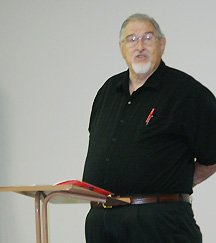PEARSALL — The ethical instructions of the Bible are just as relevant today as when they were penned, retired educator and ethicist Ebbie Smith told a group of South Texas pastors at a seminar on ministerial ethics.
“Ethics is the science or study of what we ought to do,” said Smith, who taught at Southwestern Baptist Theological Seminary from 1974 until 2000. “Morality is what we actually do.

Ebbie Smith
|
“Talking about pastoral ethics, the most important thing is to have a pastor’s heart. I’ve talked with some pastors, and they make you think the last thing they want to do is spend time with people.”
While the Bible is filled with instruction, it must be studied if its full meaning is to be known, Smith said.
“The teachings of the Bible are for every person for every time — not just the past and not just the future. We must understand what it meant for the people who it was first delivered to. If we don’t understand what it meant for them, we’ll never understand it. Understand what it meant for those people and bring that principle to our culture and our time,” he said.
“And if we test the principle against the Bible and find it doesn’t measure up, we have to go back and look at that principle again, because the Bible isn’t wrong.”
It is important to look at principles, because some things are not addressed directly, he said. And some ethical issues also need a fuller reading by Christians, Smith suggested.
“Some people who stand so firmly against abortion never do one thing to help those children after they are born. There’s something wrong with a theology that allows us to tell a 12-year-old impregnated by her father, ‘Honey, you can’t have an abortion,’ and then doesn’t follow that up with, ‘We’re going to stand with you and support you the next 18 years as you raise this child,’” he said.
The Bible has all the instruction needed, but people pick and choose what they choose to live out, Smith said. Giving to the poor was one area he cited.
“It doesn’t matter too much what you believe if you don’t practice it,” he said. “I’m convinced that if Christians shared as the Bible instructs us, there would be no need in this world, but we consume much more than we need to consume and have little left to give.”
While the Bible is authoritative in its teachings, the interpretations of people about how to apply those teachings do not carry the same weight, he cautioned.
“Some people take their interpretations and say, ‘Accept that, or you don’t believe the Bible,’” Smith said.
As an illustration, in an attempt to have more to give to others, Smith said he doesn’t spend large amounts on fancy cars or on expensive suits.
“I can tell you that you shouldn’t use more than you need and that you should give to others who need it. But I can’t tell you that you should buy cheaper, older cars and buy only suits that are on sale. That’s just my application, and it’s not authoritative,” he pointed out.
He cited the redemptive-movement hermeneutic promoted by William Webb as perhaps being something worthy of a further look. Webb says it is beneficial to see how the Bible approached an issue in regard to the culture and follow its lead.
“The Bible takes homosexuality and took a stronger stand than the culture of the time did, so we should move to a stronger stand,” Smith explained.
“The Bible took a more permissive view of the place of women than the culture, and we should do the same.”
Smith also addressed practical issues that related to pastors and their churches.
“I have noted over the years that older, established pastors tell younger, less-established pastors: ‘You are the pastor. Tell the people what to do, and be authoritative about it.’ That has generally gone over about as well as a ham sandwich at a Hebrew picnic,” he said.
“You earn the right to be authoritative; you don’t start out that way. You earn that right not because you’re the pastor, but because you love them,” Smith explained.
He noted a string can’t be pushed. It gets all jumbled up, but it doesn’t go where you want it to go. A string can, however, be pulled.
“If you push people, it won’t get done. But if you guide them, encourage them, it will get done very well. You can lead people, but you can’t force them,” Smith said.
“I’m convinced that healthy growth is based on servanthood — both on the part of the pastor and the people.”
If the pastor is a servant, it is almost certain the people will follow, Smith asserted. “If he is not, the people probably won’t be either,” he continued.
“Go out, become a great church to bless other people. You are blessed to be a blessing. A lot of churches forget they are put there to be a blessing and sit around waiting for how God is going to bless them.”
The only way a church can be the church it was designed to be is for everyone in the church to be equipped to minister, Smith also said.
“If you could hire enough staff to do all the ministering, all the witnessing, all the visiting, it still would not be the biblical way of doing things. The biblical way is to train the people,” he said.
George Henson is the staff writer for the Texas Baptist Standard.

